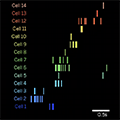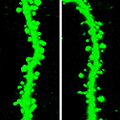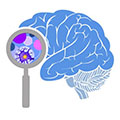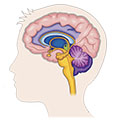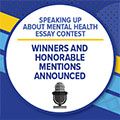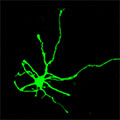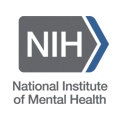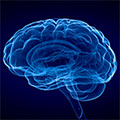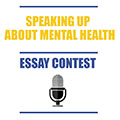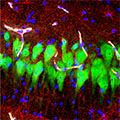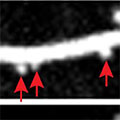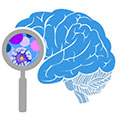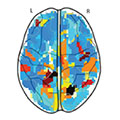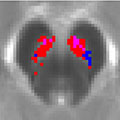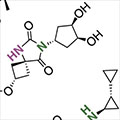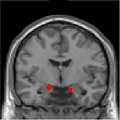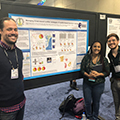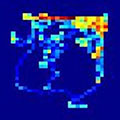Science Updates from 2019
- Emergency Department Study Reveals Patterns of Patients at Increased Risk for Suicide
-
A new NIMH-funded study found that people who presented to California emergency departments with deliberate self-harm or suicidal ideation had suicide rates significantly higher than those of demographically similar Californians in the year after discharge.
- Side Effects Mild, Brief with Single Antidepressant Dose of Intravenous Ketamine
-
A single, low-dose ketamine infusion was relatively free of side effects for patients with treatment-resistant depression.
- NIH Awards Funding for Early Autism Screening
-
The National Institutes of Health (NIH) has awarded more than four million dollars in FY 2019 to support seven research projects aimed at developing and validating screening tools to detect signs of autism spectrum disorder in the first year of life.
- Reading the Brain’s Map: Coordinated Brain Activation Supports Spatial Learning and Decision-Making
-
NIH-supported study finds that spatial “replay” in neurons may help rats learn how to navigate toward goals.
- Schizophrenia Risk Gene Linked to Cognitive Deficits in Mice
-
Mice with an impaired version of one the few genes definitively linked to schizophrenia showed abnormalities in working memory, mimicking those commonly seen in schizophrenia patients.
- New BRAIN Initiative Awards Accelerate Neuroscience Discoveries
-
The NIH has announced its continued support for the Brain Research through Advancing Innovative Neurotechnologies® (BRAIN) Initiative by funding more than 180 new BRAIN Initiative awards, bringing the total 2019 budget for the program to more than $424 million.
- Study Reveals Sex-Based Differences in the Development of Brain Hubs Involved in Memory and Emotion
-
Researchers have uncovered sex-based differences in the development of the hippocampus and amygdala—brain areas that have been implicated in the biology of several mental disorders that impact males and females differently.
- NIH Announces Winners of High School Mental Health Essay Contest
-
NIH announces 10 winners of the “Speaking Up About Mental Health! This Is My Story” national essay challenge, aimed at spurring conversations among youth about mental health and encouraging them to seek support for themselves and others.
- Gene Regulators Work Together for Oversized Impact on Schizophrenia Risk
-
Gene expression regulators work together to raise an individual’s risk of developing schizophrenia. Schizophrenia-like gene expression changes modeled in human neurons matched changes found in patients’ brains.
- NIH Announces Funding Awards for National Early Psychosis Learning Community
-
NIMH awarded six research grants for studies to develop a learning health care system for the treatment of early psychosis.
- Mental Health Research Centers Forge Collaborations – with ALACRITY
-
Mental health research center directors emerged from a recent meeting with a renewed commitment to help each other achieve their common mission – to transform care of children, adolescents and adults with severe psychiatric disorders.
- NIMH Announces New Clinical Research Toolbox
-
The National Institute of Mental Health (NIMH) recently developed a Clinical Research Toolbox designed to assist clinical investigators with the development of clinical research studies.
- NIMH Deploys New Strategy for Outreach
-
NIMH has developed NIMH Education and Awareness, a portal on the NIMH website with tools and resources designed for and dedicated to outreach.
- NIMH Grantees Named Recipients of Prestigious Presidential Award
-
The National Institute of Mental Health (NIMH) congratulates NIMH grantees who received the Presidential Early Career Award for Scientists and Engineers (PECASE).
- Novel Method Identifies Patients at Risk for HIV Who May Benefit From Prevention Strategies
-
Researchers have demonstrated the effectiveness of using algorithms that analyze electronic health records (EHRs) to help physicians identify patients at risk for HIV who may benefit from preexposure prophylaxis (PrEP), which significantly reduces the risk of getting HIV.
- Crisis and Suicide Prevention Services Struggle with Demand after Celebrity Suicides
-
The United States may lack the resources needed to meet increases in demand for suicide prevention services that occur after celebrity suicides, according to a recent study of crisis mental health services published in the journal Psychiatric Services.
- Release of “13 Reasons Why” Associated with Increase in Youth Suicide Rates
-
A study conducted by researchers at several universities, hospitals, and the National Institute of Mental Health (NIMH) found that the Netflix show “13 Reasons Why” was associated with a 28.9% increase in suicide rates among U.S. youth ages 10-17 in the month (April 2017) following the shows release, after accounting for ongoing trends in suicide rates.
- Nationwide Essay Contest Challenges High Schoolers to be Frank About Mental Health
-
The National Institutes of Health invites students ages 16 to 18 years old to participate in the “Speaking Up About Mental Health!” essay contest to explore ways to address the stigma and social barriers that adolescents from racial and ethnic minority populations may face when seeking mental health treatment.
- NIH BRAIN Initiative Tool May Transform How Scientists Study Brain Structure and Function
-
Researchers have developed a high-tech support system that can keep a large mammalian brain from rapidly decomposing in the hours after death, enabling study of certain molecular and cellular functions.
- Ketamine Reverses Neural Changes Underlying Depression-Related Behaviors in Mice
-
Researchers have identified ketamine-induced brain-related changes that are responsible for maintaining the remission of behaviors related to depression in mice — findings that may help researchers develop interventions that promote lasting remission of depression in humans.
- Fifth Annual BRAIN Initiative Investigators Meeting
-
On April 11-13, 2019, approximately 1,500 scientists from many disciplines will attend the fifth annual Brain Research through Advancing Innovative Neurotechnologies (BRAIN)® Initiative Investigators Meeting in Washington, DC. This open meeting provides a forum for discussing scientific developments and potential new directions, and to identify areas for collaboration and research coordination.
- NIMH-Supported Researcher to Receive John Dirks Canada Gairdner Award for Global Health
-
Vikram Harshad Patel, M.B.B.S., Ph.D., whose research has been funded by the National Institute of Mental Health (NIMH), will receive the John Dirks Canada Gairdner Award for Global Health. This honor recognizes the world’s top scientists and their outstanding achievements in global health research. Dr. Patel will receive the award on October 24, 2019, in Toronto, Canada.
- Suicide: How You Can Make a Difference
-
The recent deaths of two school shooting survivors has brought the topic of suicide into everyday conversations. It’s important to know some facts and to know what to do if you think someone might be at risk for self-harm.
- Bench-to-Bedside: NIMH Research Leading to Brexanolone, First-Ever Drug Specifically for Postpartum Depression
-
FDA approval of the postpartum depression treatment brexanolone represents the final phase of a bench-to-bedside journey for this drug — a journey that began in the NIMH Intramural Research Program. NIMH experts are available to provide information on postpartum depression and the importance of, and the science underlying, this new drug.
- NIH Study Reveals Differences in Brain Activity in Children with Anhedonia
-
Researchers have identified changes in brain connectivity and brain activity during rest and reward anticipation in children with anhedonia, a condition where people lose interest and pleasure in activities they used to enjoy.
- NIH Study Shows Many Preteens Screen Positive for Suicide Risk During ER Visits
-
A research team found nearly one-third of youth ages 10 to 12 years screened positive for suicide risk in emergency department settings, including those seeking help for physical concerns only.
- Neuromelanin-Sensitive MRI Identified as a Potential Biomarker for Psychosis
-
Researchers have shown that a type of magnetic resonance imaging — called neuromelanin-sensitive MRI (NM-MRI) — is a potential biomarker for psychosis. NM-MRI signal was found to be a marker of dopamine function in people with schizophrenia and an indicator of the severity of psychotic symptoms in people with this mental illness.
- Mega Docking Library Poised to Speed Drug Discovery
-
Researchers have launched an ultra-large virtual docking library expected to grow to more than 1 billion molecules by next year. It will expand by 1000-fold the number of such “make-on-demand” compounds readily available to scientists for chemical biology and drug discovery.
- Brain Biomarkers Could Help Identify Those at Risk of Severe PTSD
-
This study has shed light on the neurocomputational contributions to the development of post-traumatic stress disorder in combat veterans, finding distinct patterns for how the brain and body respond to learning danger and safety depending on the severity of PTSD symptoms.
- Puerto Rico’s “Fear Lab” Mentors Neuroscience Rigor amid Diversity
-
A lineage of young neuroscientists from diverse backgrounds trace their scientific roots to a “fear lab” in Puerto Rico that the National Institutes of Health has been supporting for two decades.
- New Findings Reveal Surprising Role of the Cerebellum in Reward and Social Behaviors
-
A new study in rodents has demonstrated, for the first time, that the brain’s cerebellum plays a role in controlling reward and social preference behavior—findings that shed light on the brain circuits critical to the affective and social dysfunction seen across multiple psychiatric disorders.
- Sensorimotor Domain Added to the RDoC Framework
-
The National Institute of Mental Health (NIMH) announces the addition of the new Sensorimotor domain to the Research Domain Criteria (RDoC) framework. The aim of the new domain is to help foster earlier and more precise identification of the role of motor systems disruptions in psychopathology and aid in the development of more effective treatments for people who are affected with these disruptions.




